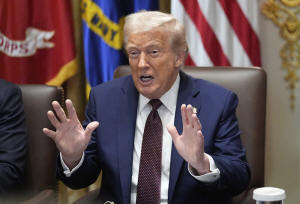Trump blocks $4.9B in foreign aid Congress OK'd, using maneuver last
seen nearly 50 years ago
[August 30, 2025]
By JOSH BOAK
WASHINGTON (AP) — President Donald Trump has told House Speaker Mike
Johnson that he won't be spending $4.9 billion in congressionally
approved foreign aid, effectively cutting the budget without going
through the legislative branch.
Trump, who sent a letter to Johnson, R-La., on Thursday, is using what’s
known as a pocket rescission — when a president submits a request to
Congress to not spend approved funds toward the end of the fiscal year,
so Congress cannot act on the request in a 45-day timeframe and the
money goes unspent as a result. It's the first time in nearly 50 years a
president has used one. The fiscal year draws to a close at the end of
September.
The letter was posted Friday morning on the X account of the White House
Office of Management and Budget. It said the funding would be cut from
the State Department and the U.S. Agency for International Development,
or USAID, an early target of Trump's efforts to cut foreign aid.
If the White House standardizes this move, the president could
effectively bypass Congress on key spending choices and potentially
throw into disarray efforts in the House and the Senate to keep the
government funded when the next fiscal year starts in October.
The use of a pocket rescission fits part a broader pattern by the Trump
administration to exact greater control over the U.S. government,
eroding the power of Congress and agencies such as the Federal Reserve
and the Centers for Disease Control and Prevention, among others. The
administration has already fired federal workers and imposed a historic
increase in tariffs without going through Congress, putting the burden
on the judicial branch to determine the limits of presidential power.

A White House official, who insisted on anonymity on a call with
reporters to discuss the move, declined to say how the administration
might use pocket rescissions in the coming years or what the upper
limits of it might be as a tool. The official expressed confidence the
administration would prevail in any legal challenges and said a goal of
the proposed spending cuts was to make the cleanest case possible for
these types of clawbacks.
Winding down USAID
Secretary of State Marco Rubio posted on X that USAID is essentially
being shuttered and congratulated White House budget director Russ
Vought for managing the process.
“USAID is officially in close out mode,” Rubio said. “Russ is now at the
helm to oversee the closeout of an agency that long ago went off the
rails.”
The 1974 Impoundment Control Act gives the president the authority to
propose canceling funds approved by Congress. Congress can within 45
days vote on pulling back the funds or sustaining them, but by proposing
the rescission so close to Sept. 30 the White House argues that the
money won't be spent and the funding lapses.
What was essentially the last pocket rescission occurred in 1977 by
Democratic then-President Jimmy Carter, and the Trump administration
argues it’s a legally permissible tool despite some murkiness as Carter
had initially proposed the clawback well ahead of the 45-day deadline.
Pushback against pocket rescissions
The move by the Trump administration drew immediate backlash in parts of
the Senate over its legality.
Sen. Susan Collins, R-Maine, said in a statement that the Constitution
“makes clear that Congress has the responsibility for the power of the
purse” and any effort to claw back funds “without congressional approval
is a clear violation of the law.”
“Instead of this attempt to undermine the law, the appropriate way is to
identify ways to reduce excessive spending through the bipartisan,
annual appropriations process," Collins said. Congress approves
rescissions regularly as part of this process."

[to top of second column]
|

President Donald Trump speaks during a cabinet meeting, Tuesday,
Aug. 26, 2025, at the White House in Washington. (AP Photo/Mark
Schiefelbein)

Senate Democratic Leader Chuck Schumer of New York warned that
Trump's use of the pocket veto could undermine the normal funding
process and risk “a painful and entirely unnecessary shutdown.”
After all, any budget agreements reached in the Senate could lack
authority if the Trump White House has the power to withhold
spending as it sees fit.
Schumer said in a statement that Republican leaders have yet to meet
with Democrats on a path to fund the government after the fiscal
year ends on Sept. 30 just as Trump tries an “unlawful gambit to
circumvent the Congress all together.”
"But if Republicans are insistent on going it alone, Democrats won’t
be party to their destruction,” Schumer said.
‘No exceptions’
Eloise Pasachoff, a Georgetown University law professor and expert
on federal spending issues, has written that the Impoundment Control
Act allows rescissions only if Congress acts within 45 days, meaning
the the White House alone cannot decide to not spend the funds.
“This mandatory language admits no exceptions, indicating that
Congress expects the funds to be used as intended before the end of
the fiscal year if it does not approve the proposed rescission,”
Pasachoff wrote in an academic paper last year.
What's in the funding?
The funds in the pocket rescission package include $3.2 billion in
development assistance grants, $520 million for the United Nations,
$838 million for international peacekeeping operations and $322
million to encourage democratic values in other countries.
Trump had previously sought to get congressional backing for
rescissions and succeeded in doing so in July when the House and the
Senate approved $9 billion worth of cuts. Those rescissions clawed
back funding for public broadcasting and foreign aid.
The Trump administration has made deep reductions to foreign aid one
of its hallmark policies, despite the relatively meager savings
relative to the deficit and possible damage to America's reputation
abroad as foreign populations lose access to food supplies and
development programs.

In February, the administration said it would eliminate almost all
of USAID's foreign aid contracts and $60 billion in overall
assistance abroad. USAID has since been dismantled, and its few
remaining programs have been placed under State Department control.
The Trump administration appealed to the Supreme Court on Wednesday
to stop lower court decisions that had preserved foreign aid,
including for global health and HIV and AIDS programs, that Trump
has tried to freeze. But on Friday, the administration withdrew its
appeal to the Supreme Court, after a favorable appeals court ruling
late Thursday.
The New York Post first reported the pocket rescission.
___
AP writers Mark Sherman, Lindsay Whitehurst and Stephen Groves
contributed to this report.
All contents © copyright 2025 Associated Press. All rights reserved |